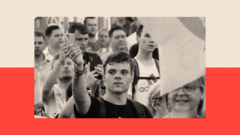Recent research has revealed a notable gender disparity in political leanings, with 26% of young men expressing favorable views towards the AfD compared to only 11% of women. On social media platforms like TikTok, the party's messaging has found significant traction, often outpacing other political voices due to a robust online presence. TikTok's algorithm has allowed the AfD to cultivate a following among youth, bypassing traditional media, which they often perceive as biased against them.
As AfD supporters, including young influencers like Celina Brychcy, navigate contemporary issues such as gender roles and immigration policies, they cultivate a narrative of traditional values that resonates with many. Despite the party's controversies and the historical baggage associated with far-right ideologies in Germany, young men increasingly view the AfD as a legitimate force for change.
The normalizing of far-right movements poses significant questions about Germany’s political landscape, drawing concerns about the potential reversion of hard-won social rights and escalating fears tied to an evolving national identity.
###
The far-right surge in Germany exemplifies a broader trend observed in Europe, as young males voice their anxiety and seek alternative narratives during tumultuous times. With alarming implications for the future, this evolution in political support underscores the necessity for addressing the cultural and social factors driving this shift.
As AfD supporters, including young influencers like Celina Brychcy, navigate contemporary issues such as gender roles and immigration policies, they cultivate a narrative of traditional values that resonates with many. Despite the party's controversies and the historical baggage associated with far-right ideologies in Germany, young men increasingly view the AfD as a legitimate force for change.
The normalizing of far-right movements poses significant questions about Germany’s political landscape, drawing concerns about the potential reversion of hard-won social rights and escalating fears tied to an evolving national identity.
###
The far-right surge in Germany exemplifies a broader trend observed in Europe, as young males voice their anxiety and seek alternative narratives during tumultuous times. With alarming implications for the future, this evolution in political support underscores the necessity for addressing the cultural and social factors driving this shift.





















